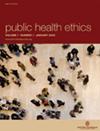人口研究结果的回归:参与者如何感知它们?
IF 2
3区 哲学
Q2 ETHICS
引用次数: 1
摘要
流行病学作为公共卫生的基石,由于生物库基础设施的使用等因素,最近发生了重大变化。在生物库相关研究中,将结果反馈给参与者构成了一个重要而复杂的伦理问题。在这项研究中,我们定性地调查了个体如何感知他们参与生物库队列研究后返回的结果。在我们对两项德国研究的31名参与者进行的半结构化访谈中,我们观察到一些参与者高估了他们将从研究中获得的个人信息的性质。虽然这种错误估计似乎不会危及招募时提供的同意的有效性,但它仍然可能威胁到参与者对研究的信任,从而威胁到他们的长期承诺,这对此类研究至关重要。我们认为,这种错误估计可能会对指导对生物样本库研究结果回报进行反思的原则产生伦理后果,即自主、有益、非恶意和互惠。我们建议,从通过研究结果的回报直接使参与者受益的想法转变,可以帮助将重点放在使整个社会受益上,从而提高使用生物银行的基于人群的研究的研究可信度。本文章由计算机程序翻译,如有差异,请以英文原文为准。
Return of Results in Population Studies: How Do Participants Perceive Them?
As a cornerstone of public health, epidemiology has lately undergone substantial changes enabled by, among other factors, the use of biobank infrastructures. In biobank-related research, the return of results to participants constitutes an important and complex ethical question. In this study, we qualitatively investigated how individuals perceive the results returned following their participation in cohort studies with biobanks. In our semi-structured interviews with 31 participants of two such German studies, we observed that some participants overestimate the nature of the personal information they will receive from the study. Although this misestimation does not seem to jeopardize the validity of the consent provided at recruitment, it may still represent a threat for participants’ trust in research and thus their long-term commitment, crucial for such studies. We argue that such misestimation may have ethical consequences on the principles guiding the reflection on the return of results in biobank research, i.e. autonomy, beneficence, non-maleficence and reciprocity. We suggest that shifting from the idea of directly benefiting participants through the return of research results could help focusing on benefiting society as a whole, thereby increasing research trustworthiness of population-based studies using biobanks.
求助全文
通过发布文献求助,成功后即可免费获取论文全文。
去求助
来源期刊

Public Health Ethics
PUBLIC, ENVIRONMENTAL & OCCUPATIONAL HEALTH-MEDICAL ETHICS
CiteScore
3.10
自引率
9.50%
发文量
28
审稿时长
>12 weeks
期刊介绍:
Public Health Ethics invites submission of papers on any topic that is relevant for ethical reflection about public health practice and theory. Our aim is to publish readable papers of high scientific quality which will stimulate debate and discussion about ethical issues relating to all aspects of public health. Our main criteria for grading manuscripts include originality and potential impact, quality of philosophical analysis, and relevance to debates in public health ethics and practice. Manuscripts are accepted for publication on the understanding that they have been submitted solely to Public Health Ethics and that they have not been previously published either in whole or in part. Authors may not submit papers that are under consideration for publication elsewhere, and, if an author decides to offer a submitted paper to another journal, the paper must be withdrawn from Public Health Ethics before the new submission is made.
The editorial office will make every effort to deal with submissions to the journal as quickly as possible. All papers will be acknowledged on receipt by email and will receive preliminary editorial review within 2 weeks. Papers of high interest will be sent out for external review. Authors will normally be notified of acceptance, rejection, or need for revision within 8 weeks of submission. Contributors will be provided with electronic access to their proof via email; corrections should be returned within 48 hours.
 求助内容:
求助内容: 应助结果提醒方式:
应助结果提醒方式:


